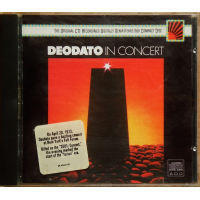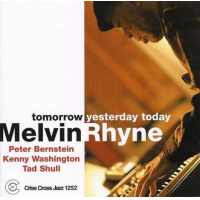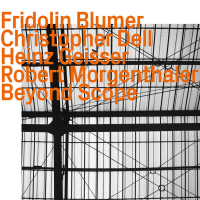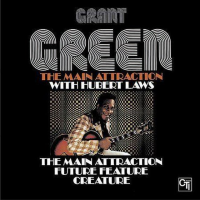Home » Jazz Articles » Liner Notes » Bill Anschell / Brent Jensen: We Couldn't Agree More
Bill Anschell / Brent Jensen: We Couldn't Agree More
It would be hard to find a purer, starker, more concentrated example of two-way jazz adaptation than We Couldn't Agree More.
The duo is a unique jazz format: the minimum ensemble. It creates special challenges for improvisers, partly because it offers unlimited freedom. Pianist Bill Anschell says, "With no bassist and no drummer, you're free to reharmonize, or slow down, or speed up. With a duo, if you're listening hard to each other, there's nowhere you can't go."
Anschell and soprano saxophonist Brent Jensen recorded this duo album with no preconceived arrangements and, for every song, the barest outline of a plan. Anschell says, "Sometimes, one of us would just start playing." Anschell just starts playing to open the album with "I'm Old Fashioned," and Jensen is instantly there to touch in the melody. Anschell unwinds a long, complementary counterline that occasionally becomes a specific response to a Jensen call. Anschell provides commentary and elaboration until seamlessly the piano segues into the lead and Jensen "comps." By the end, the listener is unaware of two separate instruments and is swept up in one vast pointillistic design. There is a particular exhilaration, a liberation, only found in the best duo jazz.
In the typical approach for a piano/saxophone duo, the pianist plays chords and a bass line while the saxophonist improvises melodies, and then the pianist takes a turn and improvises. But according to Anschell, "Brent and I valued interplay more than anything else, so we started with the idea that we were both melody instruments. Maybe I would just begin with a single note instead of a chord."
Two intersecting single-note lines state "You And The Night And The Music," rarely explicitly, but with a range of implication neither player could provide alone. Anschell says, "We wanted to play standards because that way we would both have the chord progressions in our heads. We wouldn't have to look at paper." Sometimes they use only the chords. "The People Versus Miss Jones" illustrates Anschell's principle that "there's nowhere you can't go," and never once plays the melody of "Have You Met Miss Jones." The performance is technically interesting for how two improvisers can play this fast with no set tempo and get to the same place in the tune at the same time.
But for all of the exceptional expertise on display here, the rewards of this album are aesthetic and emotional, not technical. The first take of "Solar," the rubato version, is a startling cooperative imaginative act. Jensen's notions, distantly related to Miles Davis' song, are like smears of light, and Anschell spills cascades of affirmation, also luminous. The intensity builds and when, just before the end, Anschell finally flows into the melody of "Solar," it is both revelation and release.
The pure human cry of Jensen's soprano saxophone sound is seductive. Anschell, for all his willingness to go for broke and trust his instincts, is a deeply lyrical pianist. Someone encountering them for the first time on this album is likely to exclaim the interrogative made famous in the film Butch Cassidy And The Sundance Kid: "Who are these guys?"
Anschell has performed in premier U.S. and international jazz festivals and clubs. He has made five South American tours leading his own trio, and six European tours as pianist/musical director for vocalist Nnenna Freelon. After a long residency in Atlanta, Georgia, he moved back to his native Seattle in 2002. He received a Golden Ear Award as the "Northwest Jazz Instrumentalist Of The Year" in 2005, and his trio was named "Northwest Acoustic Jazz Ensemble Of The Year" in 2006.
Jensen is an Idaho native who studied with Lee Konitz and who has performed with Gene Harris, Gary Foster, Joe La Barbera, John Clayton, Wycliffe Gordon, and Warren Vache. He is an Assistant Professor of Music at the College of Southern Idaho in Twin Falls.
Both belong to that very select company that Wynton Marsalis calls "first-class jazz musicians." Anyone who doubts it needs only to put on this album and listen to Bill Anschell and Brent Jensen as they adapt.
Liner Notes copyright © 2026 Thomas Conrad.
We Couldn't Agree More can be purchased here.
Contact Thomas Conrad at All About Jazz.
Thomas travels frequently writing about jazz outside the borders of the United States.
Track Listing
I'm Old Fashioned; Solar; The People Versus Miss Jones; You the Night and the Music; What is This Thing Called Love?; You Aren't All That; Ask Me Now; Beautiful Love; Just Friends; Solar (alternate take); On the Sunny Side of the Street.
Personnel
Bill Anschell
pianoBrent Jensen
saxophone, altoAlbum information
Title: We Couldn't Agree More | Year Released: 2009 | Record Label: Origin Records
Tags
PREVIOUS / NEXT
Bill Anschell Concerts
Support All About Jazz
 All About Jazz has been a pillar of jazz since 1995, championing it as an art form and, more importantly, supporting the musicians who make it. Our enduring commitment has made "AAJ" one of the most culturally important websites of its kind, read by hundreds of thousands of fans, musicians and industry figures every month.
All About Jazz has been a pillar of jazz since 1995, championing it as an art form and, more importantly, supporting the musicians who make it. Our enduring commitment has made "AAJ" one of the most culturally important websites of its kind, read by hundreds of thousands of fans, musicians and industry figures every month.






















